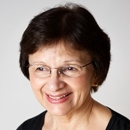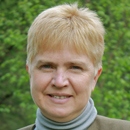Academic Editors
The following people constitute the Editorial Board of Academic Editors for PeerJ. These active academics are the Editors who seek peer reviewers, evaluate their responses, and make editorial decisions on each submission to the journal. Learn more about becoming an Editor.

Joanna Moraczewska
Professor at Kazimierz Wielki University in Bydogszcz, Faculty of Biological Sciences, Poland. Head of the Department of Biochemistry and Cell Biology. Our research concentrates on molecular mechanisms of actin filament regulation in muscle and non-muscle cells.

Jose M. Moran
Jose M. Moran, Ph. D., is currently Assistant Professor in the Nursing Department in the University of Extremadura, Spain. He completed his Ph. D. in Biochemistry and Molecular Biology. Actually he is a member of the Metabolic Bone Diseases Research Group in the University of Extremadura. He is a reviewer and Academic Editor of several international journals. Actually he combines both the research in the field of Metabolic Bone Diseases and the research in Research Designs and Statistical Methods used in the research in Health Sciences.

Xosé Anxelu G. Morán
Research Professor at the Oceanographic Center of Gijón/Xixón (IEO, CSIC), Spain. I was Associate Professor of Marine Science, Red Sea Research Center, King Abdullah University of Science and Technology (KAUST), Saudi Arabia, from 2014 to 2020 (currently adjunct). I joined the IEO in 2001 after my PhD training at the Institute of Marine Sciences (ICM, CSIC) in Barcelona. I am a biological oceanographer and microbial ecologist addressing the role of microbial plankton in biogeochemical carbon cycling from different perspectives. My research interests include the trophic relationships between phytoplankton and heterotrophic prokaryotes, the long-term dynamics of planktonic microorganisms and their response to global change, with particular emphasis on warming using the metabolic ecology framework. I combine experimental approaches with large-scale observations, both spatial and temporal, in order to predict the future direction and extent of change in the structure and functioning of marine microbial food webs.

Paula I. Moreira
Paula I. Moreira is Assistant Professor at the Faculty of Medicine and Principal Investigator at the Center for Neuroscience and Cell Biology, University of Coimbra. Moreira published more than 100 scientific peer-reviewed articles and she is on the editorial board of over 10 journals. Paula Moreira won the Stimulus to Research prize, in 2003, supported by the Calouste Gulbenkian Foundation and, the L’Oreal for Women in Science, in 2008, supported by L'Oreal Portugal/UNESCO/ FCT.

Daniel C Moreira
My research interests lie in the area of redox processes in biology and medicine. My main line of work investigates the role and underlying mechanisms of redox metabolism (i.e., reactive species and endogenous antioxidants) in animals during the depression of metabolic rate induced by environmental stresses, including projects that examine the modulation of antioxidant systems in animals exposed to oxygen deprivation and during other situations of metabolic depression. More recently and concurrently, I am also involved in the prospection of bioactive natural compounds (e.g., peptides from amphibians, plant extracts and phytochemicals) for health applications, with emphasis on antioxidant molecules.

Silvia N. J. Moreno
Professor of Cellular Biology and member of the Center for Tropical and Emerging Global Diseases of the University of Georgia. Former recipient of a Burroughs Welcome New Investigator Award. Undergraduate Coordinator of the Department of Cellular Biology.

Boyd A Mori
Assistant Professor of Agricultural and Ecological Entomology in the Department of Agricultural, Food and Nutritional Science, University of Alberta.
Research in our lab focuses on varying aspects of insects in agricultural systems. Our focal areas of research include chemical ecology, population genetics, and insect-plant interactions. We use a variety of techniques from field and laboratory bioassays to transcriptomics and genomics to examine basic and applied ecological questions.

Ludmilla A Morozova-Roche
Professor of Medical Biophysics, Department of Medical Biochemistry and Biophysics, Umea University, Sweden. Editor of journal "Diseases".

Juan J Morrone
Full professor of Biogeography, Systematics and Comparative Biology at the Facultad de Ciencias, Universidad Nacional Autónoma de México (UNAM), Mexico. He works on phylogenetic systematics of weevils (Coleoptera: Curculionidae) and evolutionary biogeography and regionalization of the Neotropical and Andean regions.

Cecilia Mortalò
Cecilia Mortalò completed her PhD at the University of Modena and Reggio Emilia (Italy) in 2005. Since 2005 she has been a researcher at the Institute of Condensed Matter Chemistry and Technologies for Energy of the Italian National Research Council. The scientific and technological skills are in the field of chemistry and technology of materials. In particular, she has expertise in the preparation and study of a variety of advanced functional ceramic materials for different applications, i.e. in the energy field (solid oxide fuel cells, energy storage systems (ZEBRA batteries), hydrogen separation and purification, protective coatings (protection against corrosion, anti-dirty and antifreeze treatments), phosphors with luminescent properties and colloidal suspensions (inks and nanofluids).
In these areas, she has competences in different conventional and un-conventional synthetic approaches such as sol gel techniques, solid state synthesis (SSR), microwave-assisted syntheses (sol-gel and hydrothermal) and sintering, classic and reactive sintering, wet-based deposition techniques (spin coating, dip coating, air-spray, drop-casting, solvent-casting, EPD). The most recent research activity focuses on high entropy metal alloy (HEA) materials for extreme conditions applications and corrosion resistance in the marine environment.
She has been involved as participant and senior investigator in several national and international projects focused on development of advanced materials for extreme conditions and energy applications and she has published 37 scientific papers in international peer-reviewed ISI journals. She is referee for various international scientific journals and she has been involved as co-guest editor for some special issues and topics.

Monika Mortimer
Senior Researcher at the National Institute of Chemical Physics and Biophysics, Tallinn, Estonia. Research interests and experience include ecotoxicology, environmental effects of engineered nanomaterials, fate and transport of contaminants of emerging concern, and microbiology.

G Lorimer Moseley
Professor of Clinical Neurosciences & Foundation Chair in Physiotherapy, Director of Innovation in Implementation and Clinical Translation (IIMPACT) Research Collaboration at the University of South Australia; Fellow of the Australian Academy of Health & Medical Science; Hon Fellow, Faculty of Pain Medicine, Australia New Zealand College of Anaesthetists; Fellow, Australian College of Physiotherapists & Honoured Member, Australian Physiotherapy Association; Principal Research Fellow, National Health & Medical Research Council of Australia.

